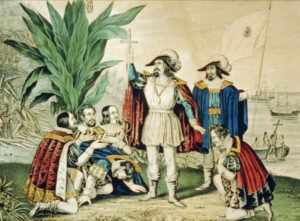To paraphrase the Passover liturgy, if the destruction of the Second Temple was the only bad thing that happened to the Jews on the ninth of Av, it would have been enough. But the calamities just kept piling up.
While this tends to be presented as either part of a Master Plan or just a strange cosmic coincidence, I can’t help but wonder whether some human intervention was involved in the later events.
Coincidence is certainly a possibility. It seems as though the order that marched the Cherokee and their allies twelve hundred miles west to the Oklahoma territory was given without thought to the fact that the Cherokee thought of death as a long walk west, which probably contributed to the horrifically high mortality rates on the Trail of Tears.
Still, before the Jews were expelled from Spain on tish a b’av in 1492, they had enjoyed a long period of harmony and inclusion with their Moorish and Christian neighbors. And in the years leading up to the expulsion, Torquemada had been devising increasingly sadistic means of torture (or incentives to salvation, if you happen to be clinging to that perspective). Isn’t it possible, therefore, that when he finally convinced Ferdinand and Isabella to expel the Jews, he would also have picked a date that would increase their misery?
Supporting that theory is the fact that the edict was actually announced back in March of 1492. Further fuel lies in the fact that the original deadline on the secular calendar was July 31, but the deadline was extended to August 2—perhaps to correspond more closely with the holiday?
The four months between the edict and the deadline were nasty ones for the Jews—those who chose to leave gave up everything they owned and were forbidden to take their fortunes out of the country. Rumors spread that they had swallowed their gold and jewels to smuggle them out of the country, and many of those fleeing were slit open by robbers as a consequence.
At least a few took another route out of Spain. Columbus set sail on August 3, 1492, just 24 hours after the extended date. He’s known to have taken at least one practicing Jew along, whose knowledge of Hebrew would come in handy in trading in the East Indies.
In addition, scholars have suggested that the expedition included a number of “crypto-Jews”—those who pretended to convert while maintaining their Jewish identity and practice in secret. One theory is that the number included no other than Cristobal Colon himself. The conquest of the “New World” continued to attract men whose Jewish lineage made Spain a dangerous place—two of the brothers of St. Teresa of Avila became conquistadores.
The Atlantic Ocean wasn’t sufficient distance from the Spanish crown for some of the Jews who were hiding their identity. After landing in Central and South America, they went as far into the hinterland as they could get, to the most remote province of New Spain—now known as New Mexico.
Their story was hidden for hundreds of years, until a Jewish historian got a job in New Mexico and started exploring the strange rumors of Spanish-speaking people whose history in New Mexico could be traced back many generations—but who always lit two candles on Friday night, ate goat instead of pork, circumcised their male children and ate unleavened bread every spring.
The story has, not surprisingly, become controversial. Gravestones carved with the Star of David were not where the historian said they were. Some of the people who seem to be following Jewish practice have fervently denied it. Others, though, have proudly claimed their identity and have officially converted. The City of Albuquerque devotes a page of its website to the history of the crypto-Jews in New Mexico, and the Road Scholar program (formerly known as “Elder Hostel”) offers a popular week-long program on the Jewish history of New Mexico.
As with all the other tish a b’av calamities, Jews survived the expulsion from Spain in ingenious and inspiring ways. Maybe this year’s prayer can include the words from the Sephardic tradition:
Load al Señor que es bueno,
(Praise the Lord who is good)
Que para siempre su merced. (Whose mercy endures forever.)

